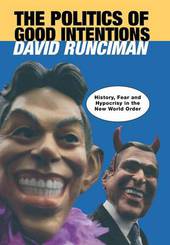
|
The Politics of Good Intentions: History, Fear and Hypocrisy in the New World Order
Hardback
Main Details
| Title |
The Politics of Good Intentions: History, Fear and Hypocrisy in the New World Order
|
| Authors and Contributors |
By (author) David Runciman
|
| Physical Properties |
| Format:Hardback | | Pages:224 | | Dimensions(mm): Height 235,Width 152 |
|
| ISBN/Barcode |
9780691125664
|
| Classifications | Dewey:327 |
|---|
| Audience | | Professional & Vocational | | Tertiary Education (US: College) | |
|---|
|
Publishing Details |
| Publisher |
Princeton University Press
|
| Imprint |
Princeton University Press
|
| Publication Date |
22 January 2006 |
| Publication Country |
United States
|
Description
Tony Blair has often said that he wishes history to judge the great political controversies of the early twenty-first century--above all, the actions he has undertaken in alliance with George W. Bush. This book is the first attempt to fulfill that wish, using the long history of the modern state to put the events of recent years--the war on terror, the war in Iraq, the falling out between Europe and the United States--in their proper perspective. It also dissects the way that politicians like Blair and Bush have used and abused history to justify the new world order they are creating. Many books about international politics since 9/11 contend that either everything changed or nothing changed on that fateful day. This book identifies what is new about contemporary politics but also how what is new has been exploited in ways that are all too familiar. It compares recent political events with other crises in the history of modern politics--political and intellectual, ranging from seventeenth-century England to Weimar Germany--to argue that the risks of the present crisis have been exaggerated, manipulated, and misunderstood. David Runciman argues that there are three kinds of time at work in contemporary politics: news time, election time, and historical time. It is all too easy to get caught up in news time and election time, he writes. This book is about viewing the threats and challenges we face in real historical time.
Author Biography
David Runciman is Lecturer in Political Theory at Cambridge University, and Fellow in Politics at Trinity Hall, Cambridge. He is the author of "Pluralism and the Personality of the State". He has worked as a columnist on the "Guardian" newspaper, and has written for a wide variety of other publications. He currently writes about politics for the "London Review of Books".
Reviews"Mr. Runciman is a keen observer of contemporary political life whose sophisticated sense of history both tempers and enlivens his often thrilling polemics. Over the course of the collection, Mr. Runciman compares the political fallout from Iraq to the Suez crisis, uses the model of Weimar Germany to explore the possibilities of Iraqi reconstruction and democracy, and borrows from thinkers like Max Weber to shed light on contemporary politics. The results are never pedantic and almost always deeply revealing."--Jason Moring, New York Observer "Runciman concludes, there is little new about the new world order. Whatever difficulties it throws up are best dealt with by going back to political basics--having strong parties, muscular parliaments, balanced constitutions, an alert judiciary and a watchful public. It is a measure of how far we have traveled from the liberal democratic norm that this comes across as a radical cry."--Alison Rowat, The Herald "The proximate cause of Tony Blair's decline is self-evident: the Iraq war and its sequel. However, as David Runciman shows in this mordant study of political hypocrisy and the misuse of history in our time, the inability to distinguish make-believe from facts, the contempt for due process and the almost willful ignorance of history that were the hallmarks of Blai"s Iraq adventure could, and should, have been detected well before it."--David Marquand, New Statesman "David Runciman provides a brilliant analysis of the contemporary politics of fear by situating the post-9/11 world within a layering of temporal periods and using the broad historical time in juxtaposition with 'election time' and 'news time'. Through such a prism the fear generated and hypocrisy of much current political discourse and justification for the pursuit of war in Iraq is dissected."--David Ryan, International Affairs "David Runciman combines the expositional clarity of a talented political journalist and commentator with the conceptual concerns, historical depth, erudition, and theoretical sophistication of a gifted scholar. The result is a lucidly and gracefully written book that usefully probes fundamental issues raised by both the terrorist attacks of 11 September 2001 and the highly dubious patterns of response associated with the political leadership of George W. Bush in the United States and Tony Blair in the United Kingdom."--Richard Falk, International History Review "This is a powerful piece, a short critique of the types of rhetorical arguments used by the creator of New Labor in his notorious 'preacher on a tank' mode. Runciman assails the use of 'new dangers' as a justification for 'new obediences,' the way that if a 'risk' is 'new,' a democratic leader need not make the normal informed balance of known risk and known freedoms, and thus the way that not taking the country to war becomes a 'risk no responsible government could afford to take.' ... Essential for understanding how he is likely to be judged when he leaves office? Sadly, absolutely."--Peter Stothard, Globe and Mail "The Politics of Good Intentions ... signals a welcome re-engagement of contemporary political thinkers with politicians' thought. We can but hope that Runciman's efforts will be reciprocated."--Political Studies Review
|